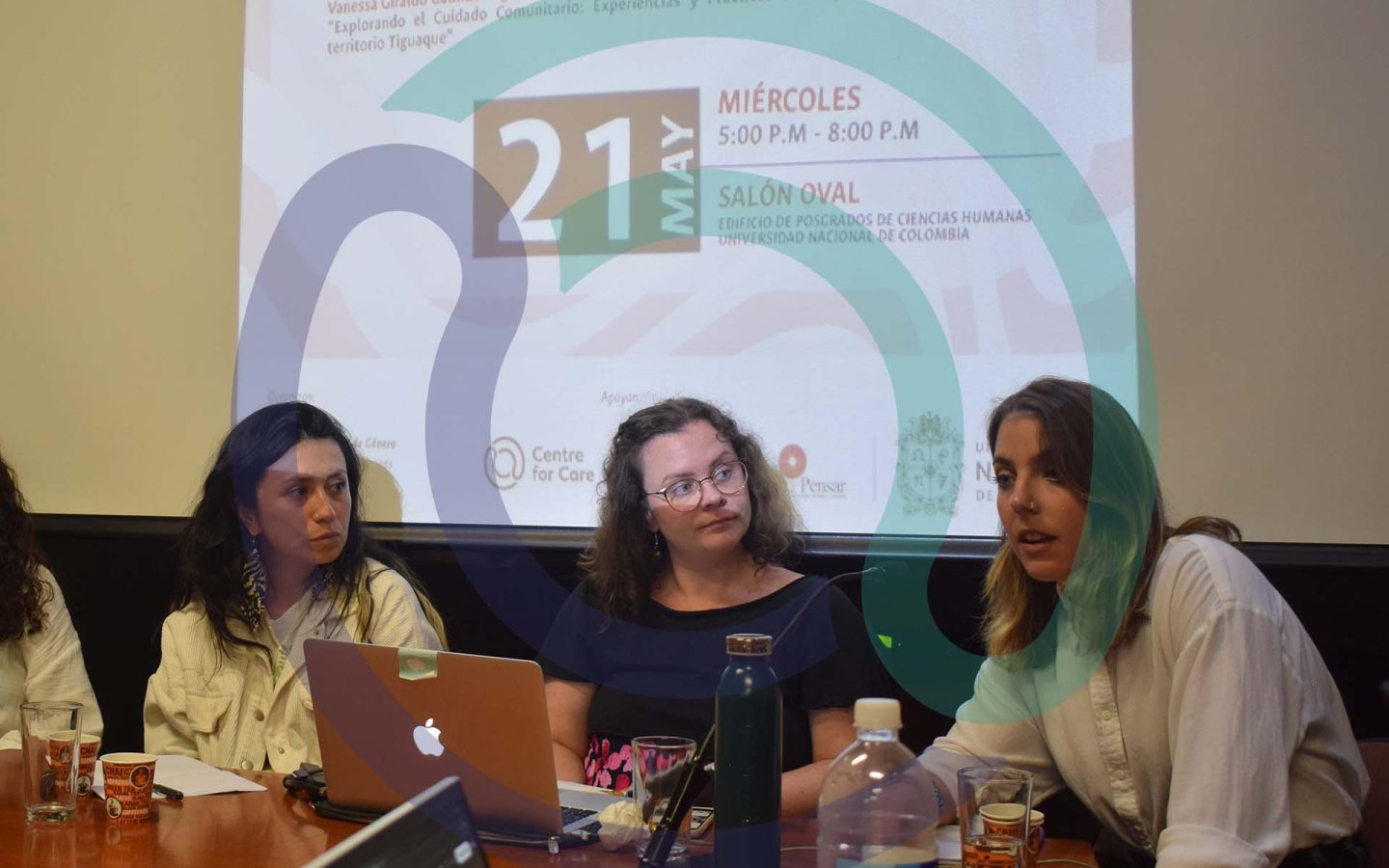From the outset of my PhD studies in October 2024, my intention has been to maintain a feminist approach to my research. Broadly speaking, this implies politically engaged work that challenges the interacting structures of power and oppression that produce our everyday lives and situates the researcher (and those about whom we want to learn) in a specific, embodied, social and historical context. It was in this vein that I applied for a grant from the Centre for Care’s Capacity Building Fund: I planned to return to Universidad Nacional de Colombia (UNAL), where I completed my master’s in gender studies, to further explore how I can approach care from a feminist perspective.
The trip led me to reflect on the relationship between feminist approaches and care, not only in academic research but also in social policy and our ways of working with colleagues and peers. Rather than presenting ‘lessons learnt’ from the trip, I will share three key events and the reflections that each one provoked. I hope this piece serves to prompt conversations in the Centre around international knowledge exchange and collaboration.
What does it mean to care? A student led event and a foundation for collaboration
Before travelling I arranged to run an event in partnership with the Escuela de Estudios de Género (School of Gender Studies, UNAL) and the Instituto Pensar (Pontificia Universidad Javeriana) in Bogotá. The Escuela de Estudios de Género is renowned in the region for its transformative approach to postgraduate education and Instituto Pensar focuses on interdisciplinary research and study.
The overlapping relevance of care to the different research aims and empirical work of their students and academic staff mean that interesting contributions to Latin American understandings of care have come from these institutions. We invited postgraduate students from both to share their research projects on care in a symposium entitled ‘What does it mean to care? A conversation around caring from a feminist perspective’, which can be viewed in Spanish on Youtube.
Including myself, we had 4 presentations spanning diverse themes. Elisa Albás Susín presented on her current doctoral research on Latin American domestic workers in Spain. She was in Colombia for a research visit with Instituto Pensar from the Universidad de Zaragoza and shared her experiences of carrying out field work with returning migrants in Bogotá. Angie Nieto Agudelo, a master’s student at the Escuela de Estudios de Género, talked about her current project which looks at drawing and writing as methods for preserving memories of care. Her autoethnographical approach demonstrates an interpellation of theory and personal reflections, offering a powerful way of positioning care in everyday life. Finally, Vanessa Giraldo Galindo is a graduate of a master’s in social policy at the Pontificia Universidad Javeriana. She shared her work on the practices of community care that sustain the territory of Tiguaque, Bogotá and those who live there. The presentation highlighted the importance of holistic approaches to care that centre collective experience and connections between communities and their territories.
Something I have long valued about feminist academic spaces (at least those I have been fortunate to be involved in) is the intentionality behind them to produce transformative, politically engaged work. The dynamic between us as students left me feeling motivated, even empowered: we felt the passion in each other’s words and took encouragement from our shared objectives of challenging the hierarchical power structures that permeate our societies, political landscapes, homes. Having the opportunity to arrange the event as a student, with the support of other students, felt like a more horizontal approach to knowledge sharing. Coming back to the Centre, I think it would be beneficial to think about how the PhD community can engage with our peers in partner institutions, as we have been able to do within the Centre itself.
CLACSO conference – Care as a human right
The timing of my trip coincided with the CLACSO (Consejo latinoamericano de ciencias sociales – Latin American social sciences council) conference, held regionally every four years. This year they had a forum on ‘Critical perspectives on care, gender equality and social justice’ which provided an opportunity to hear well known international speakers. I found it particularly exciting to note that all the discussions were rooted in feminist conceptualisations of care stemming from the sexualised, racialised division of labour. Among the speakers was Silvia Federici, an international reference for work on care and social reproduction, who took the opportunity to advocate for European states’ defence budgets to be invested in care. In our own present political climate, this felt overwhelmingly relevant.
During the conference I attended a workshop run by Cuban sociologist Magela Romero, who has been a key figure in her country’s implementation of an ‘integrated system of care’. Romero called on the work of Laura Pautassi (2023), who advocates for the recognition of care as a human right. While the naturalisation of care work as women’s work makes this difficult, understanding care from a position of co-responsibility rather than as a duty, only for some, is a step towards recognising care as a right. This would encourage social and state investment in diverse provisions for care and oblige states to take responsibility for the provision of care throughout the life course.
The workshop brought forth some examples of ‘integrated systems of care’ in Latin America. Uruguay’s system is a collection of public and private provisions for care and training funded, provided and organised across different sectors and institutions (Sistema de Cuidados 2022). Similarly, Cuba’s system is intended to strengthen the resources available for providing flexibility in approaches to care, which is essential for guaranteeing the fulfilment of care as a right (Cubavisión Internacional 2023). Colombia’s National Programme of Care, unlike the first two examples, focuses on the rights of carers through institutional support and recognition of their work. Another key objective is to “strengthen community care organisations”, making their role visible and changing perceptions about who can, and should, provide caring labour (Ministerio de Igualdad y Equidad 2024).
It seems to me that these are examples of how states can successfully articulate the right to care by accepting their responsibility for guaranteeing access and provision to care for all. Drawing on feminist understandings of care, these systems show that it is possible to develop cultures of co-responsibility. I return to Federici’s words to insist on the transformative value of care as an investment in the future, something our own government would do well to recognise.
Les Herejes – the need for translation of knowledge
I was invited to participate in the latest season of the Escuela de Estudios de Género’s podcast ‘Les Herejes’ (the heretics), entitled ‘work from a feminist perspective’. I had the chance to talk about my work, and the Centre, however perhaps my most relevant contribution was to outline the place of paid care work in the British context. The colonial history of the NHS and the limited provision of social care, the racialisation of care work and the devaluing of migrant care workers, without whom we would struggle to provide care at all. The questions I am used to answering when I discuss my work is “are they nurses?” or “are they domestic workers?”
In Colombia, the role we would describe as a ‘care worker’ most aligns with the work of domestic workers, who in many cases live with their client. The work is precarious and unregulated, much like that of migrant domestic workers in the UK (Anderson 2014). As I mentioned in the previous section, Colombia’s National Programme of Care takes a step towards valuing and strengthening community care and tackling gendered divisions of caring labour. However, there are still numerous examples of precarious working environments for care providers which promoting a gendered division of labour and exploitative working conditions for migrants (Esguerra Muelle 2021).
The process of ‘translating’ diverse understandings and structures of care across geographical and linguistic borders is important. The knowledge we produce is situated in our own social, political contexts, which means that even ‘everyday’ concepts for us may be interpreted very differently elsewhere. Taking time to learn about each other’s experiences and the particular conditions from which we see the world enabled this process of translation between myself and existing and new colleagues, opening up future avenues of collaboration.
Back to Sheffield
What I have shown in this short reflection is how the principles of a feminist approach can prompt fruitful spaces for collaboration and learning across professional, academic and social settings. Firstly, the success of the student-led event shows the potential for peer support and offers renewed motivation for socially conscious, politically charged research with shared goals of transformation. Secondly, it was inspiring to hear about how feminist work to dismantle sexual divisions of care work is contributing to social policy in Latin America. The examples of integrated systems of care demonstrate that cultures of co-responsibility are possible when states commit to providing flexible, quality care at all stages of the life course.
Finally, throughout the trip I was reminded of the significance of recognising, articulating, inhabiting the places from which we speak. Our opportunities and experiences unavoidably guide the concepts we use and the theories we engage with. Successfully nurturing relationships across geographical and social contexts means translating our ways of comprehending our everyday. Listening, discussing, adapting our words to their new surroundings, being sensitive to their meanings and impact, is essential to working internationally towards the changes we wish to make.
I want to thank Leidy Meza Sarmiento, a dear friend and communications representative for the Escuela de Estudios de Género, and Kelly Davidge and Sarah Givans from the Centre for Care. Without their support and logistical knowledge, I wouldn’t have been able to take advantage of this opportunity.
Bibliography
Anderson, Bridget. 2014. “Nations, migration and domestic labor: The case of the UK.” Women’s Studies International Forum 46: 5-12.
Cubavisión Internacional. 2023. “Desarrollo global durante el 2023 (Agenda Cuba).” Youtube. https://www.youtube.com/watch?v=QGtJUzFDIZY&t=676s.
Esguerra Muelle, Camila. 2021. “Tramas transnacionales del cuidado: una ‘lucha con los ángeles’, teoría y metáforas sobre cuidado y migración ” Antípoda. Revista de Antropología y Arqueología (43): 121-142.
Ministerio de Igualdad y Equidad, Oficina de Saberes y Conocimientos Estratégicos. 2024. Programa Nacional de Cuidado. Ministerio de Igualdad y Equidad, . https://www.minigualdadyequidad.gov.co/documents/d/guest/programa_nacional_de_cuidado.
Pautassi, Laura. 2023. El derecho al cuidado. De la conquista a su ejercicio efectivo. Friedrich-Ebert-Stiftung. Sistema de Cuidados. 2022. “Conocé el Sistema Nacional Integrado de Cuidados.” www.gub.uy. https://www.gub.uy/sistema-cuidados/comunicacion/publicaciones/conoce-sistema-nacional-integrado-cuidados.




